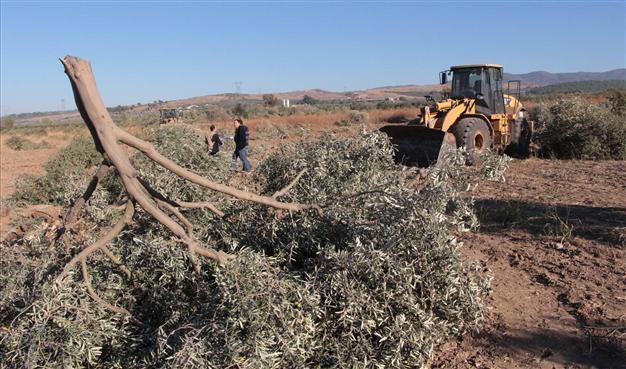Gov't assisted land expropriation damages nature, favors companies
Sevim Songün Demirezen

The expropriation of olive plantations in Soma by a Cabinet decision triggered a strong local resistance against the coal plant project. DHA Photo
Turkey has recently seen the expropriation of large amounts of land for use by energy companies with the help of the government, regardless of its value to the environment or local history.
The Official Gazette, where all laws and amendments are published, shows the increase in the Turkish government’s “rapid expropriation” decisions in recent years. In 2011, the Cabinet decided on rapid expropriation in just 11 cases, a number that increased remarkably to 160 in 2012, according to the Sendika.org news website. The number of rapid expropriation decisions increased again in 2013 to 250, according to the Official Gazette.
The government made changes to a law considering the expropriation of land in emergency situations, such as natural disasters or war, in 2011, after an earthquake in the southeastern province of Van. It claimed that the massive damage in the city had been caused by widespread illegal constructions, which had to be halted by introducing a law permitting the government to rebuild such buildings.
According to the amendment, rapid expropriation can be considered in three situations: After natural disasters, at times where there is a risk of a natural disaster, or by a Cabinet decision if it is for the public good. Since the amendment passed, the third criterion has been widely used by the government for its development projects, at the expense of environmental damage.
Naturally protected areas, such as streams in the Black Sea region, are also the victims of expropriation decisions, many of which have been made by the government to allow for the construction of hydroelectric power plants. In most cases, local courts rule against the construction of plants in these areas on the grounds that serious damage will be inflicted, but much damage has often taken place due to lengthy trials.
The controversial latest example took place in the small Aegean village of Yırca, where villagers were beaten by officials of a proposed coal power plant, who cut down many half-century-old olive trees. In this case, after all the trees were cut, a court ruling halted the expropriation decision. But the locals could not celebrate, as they are now in mourning for the trees.
